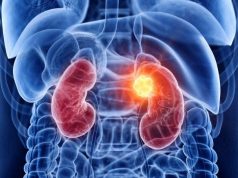The 2017 Genitourinary Cancers Symposium
The American Society of Clinical Oncology’s annual Genitourinary Cancers Symposium was held from Feb. 16 to 18 in Orlando, Fla., and attracted more than 2,000 participants from around the world. The conference highlighted recent advances in the diagnosis, prevention, and management of genitourinary cancers, including prostate, kidney, bladder, and testicular.
In one study, Emma Hall, Ph.D., of the Institute of Cancer Research in London, and colleagues found that chemoradiotherapy significantly reduces the risk of locoregional recurrence among patients with muscle-invasive bladder cancer.
“We now estimate that the risk reduction is approximately 40 percent, with five-year locoregional control rates of 63 percent with chemoradiotherapy and 49 percent with radiotherapy alone,” Hall said. “We also see fewer salvage cystectomies with chemoradiotherapy (14 versus 22 percent at five years) and a significant improvement in bladder cancer-specific survival when we account for known prognostic factors.”
The investigators found no evidence of differences in late toxicity or in locoregional control between the standard and modified volume radiotherapy treatments.
“The data provide robust level-1 evidence for the use of chemoradiotherapy with 5-fluorouracil/mitomycin C as a standard treatment for muscle-invasive bladder cancer,” Hall said.
Several authors disclosed financial ties to the pharmaceutical, biotechnology, and medical device industries.
Guru Sonpavde, M.D., of the University of Alabama in Birmingham, and colleagues found that circulating tumor DNA (ctDNA) is frequently found in patients with metastatic castration-resistant prostate cancer (mCRPC).
The investigators found that gene alterations were similar to alterations previously reported using metastatic tumor tissue analysis of patients with mCRPC, and a higher number of genes altered was associated with poor outcomes. Specifically, androgen receptor gene alterations in ctDNA were more common in previously treated patients with mCRPC and were associated with poor clinical outcomes.
“There is no immediate impact on routine clinical practice. However, the ctDNA platform appears highly promising to evaluate tumor DNA alterations since it resembles tumor tissue analyses in other studies,” Sonpavde said. “The results have implications for future research, as androgen receptor alterations may be driving resistance and new drugs targeting these alterations warrant an aggressive focus.”
Several authors disclosed financial ties to the pharmaceutical, biotechnology, and medical device industries.
ASCO: Pembrolizumab Is Good Second-Line Tx in Urothelial CA
TUESDAY, Feb. 21, 2017 (HealthDay News) — For patients with advanced urothelial cancer that has recurred or progressed after platinum-based chemotherapy, pembrolizumab is associated with increased overall survival, according to a study published online Feb. 17 in the New England Journal of Medicine. The research was published to coincide with the American Society of Clinical Oncology’s annual Genitourinary Cancers Symposium, held from Feb. 16 to 18 in Orlando, Fla.
Abstract
Full Text
Editorial
More Information
ASCO: Taking Abiraterone Acetate With Low-Fat Meal Can Cut Cost
MONDAY, Feb. 20, 2017 (HealthDay News) — Eating a low-fat meal when taking an expensive prostate cancer drug can cut the cost of the medication by three-quarters, according to research presented at the American Society of Clinical Oncology’s annual Genitourinary Cancers Symposium, held from Feb. 16 to 18 in Orlando, Fla.
Press Release
More Information
ASCO: Alvimopan Helpful for Men Undergoing Testicular CA Surgery
FRIDAY, Feb. 17, 2017 (HealthDay News) — For men with testicular cancer undergoing retroperitoneal lymph node dissection (RPLND), alvimopan may reduce hospital length of stay (LOS) and enhance gastrointestinal recovery, according to a study presented at the American Society of Clinical Oncology’s annual Genitourinary Cancers Symposium, held from Feb. 16 to 18 in Orlando, Fla.
ASCO: Antibiotics May Have Negative Impact in Renal Cancer
FRIDAY, Feb. 17, 2017 (HealthDay News) — For patients with metastatic renal cell carcinoma (mRCC) receiving immune checkpoint inhibitors, treatment with broad-spectrum antibiotics (ATBs) can reduce progression-free survival, according to research presented at the American Society of Clinical Oncology’s annual Genitourinary Cancers Symposium, held from Feb. 16 to 18 in Orlando, Fla.
Copyright © 2017 HealthDay. All rights reserved.







